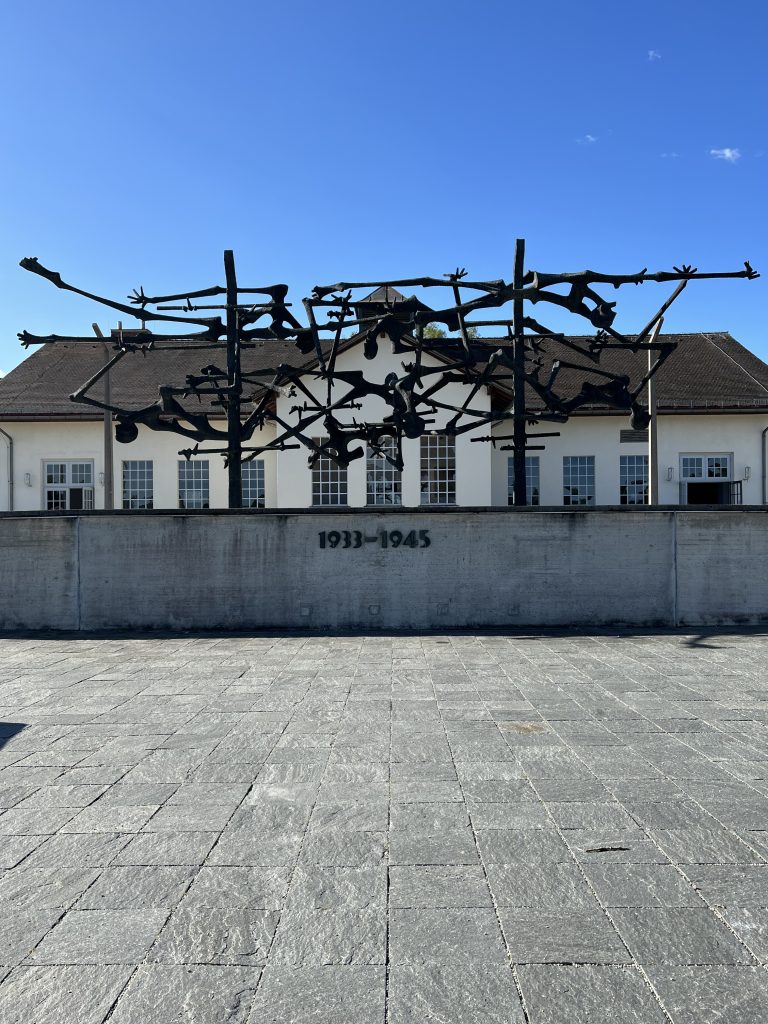Hamas slaughter of Jews echoes Hitler’s atrocities
The brutal Hamas slaughter of 1,400 people in Israel that began on Oct. 7 has been described by many as the deadliest assault on the Jewish people since the Holocaust.
Images and news reports of burnt babies, women being raped, people being kidnapped, and families being murdered inside their homes draws parallels to crimes perpetrated against the Jewish people by the Nazis and their collaborators during World War II.
Even with the release of just four of the more than 200 hostages being held captive by Hamas —many were held in tunnels in which people had been executed— the horrid picture of the atrocities being committed is becoming ever clearer by the day. Israel has been dealing with terrorism since its inception as a state in 1948.

One of the hostages, Yocheved Lifshitz, 85, had lived on a kibbutz near Gaza with her husband. She and Oded, 83, are peace activists. They were separated upon capture. Oded is believed to still be in Hamas’ captivity.
Lifshitz spoke with reporters while being treated at a Tel Aviv hospital.
“Masses swarmed our houses, beat people, and some were taken hostage. They didn’t care if they were young or old.”
Lifshitz said upon capture she was forced to surrender her personal belongings and was assaulted in the ribs with sticks before being taken into a tunnel that led to rooms where the other prisoners were being held.
Lifshitz was released on Oct. 23 after 17 days of captivity. She shook hands with one of the terrorists upon her release and said “Shalom,” which in Hebrew means “hello,” “goodbye,” and “peace.” Her gesture of shaking hands was described as a moment of grace among those who knew her, according to news reports.
How do the atrocities compare to the Holocaust?
One of the world’s most renowned Holocaust scholars doesn’t think there is a comparison.
“What happened is not analogous to the Holocaust as much as it is analogous to pogroms,” Michael Berenbaum told the Baltimore Post-Examiner.
Berenbaum served as project director overseeing the creation of the United States Holocaust Memorial Museum and later became the first director of the museum’s Research Institute. He is now a professor in Jewish Community Leadership at American Jewish University in Los Angeles.

“The reason it is not directly analogous to the Holocaust is because the Holocaust used extraordinarily sophisticated methodology, which moved from Holocaust by bullets and mobile killing units in which they rounded up the Jews in their entirety and shot them town by town and village by village. And then they reversed the process and made the victims mobile and the killing centers stationary in which they used an assembly line factory process of the murder almost in a depersonalized structural way.”
But Berenbaum did say that some of the lessons of the Holocaust do apply here.
“What we know from the Holocaust is that human beings are even educated human beings capable of savagery. Animals are not capable of this type of savagery. It is human beings inspired by an ideology of hatred. And not bound either by law or considerations of the humanity of the other.”
During WWII, the Allies were forced to level Germany with bombs to defeat the Nazis and Nazism. In this war, Israel has launched retaliatory airstrikes against Hamas, which have thus far killed more than 5,000 Palestinians, many of them innocent civilians, according to the Gaza Health Ministry.
The world is on edge fearing the conflict could eventually engulf the entire Middle East and even the U.S., which has sent two strike aircraft carriers to the Mediterranean Sea to deter Israel’s enemies, such as Iran, from entering the conflict. On Oct. 19, a U.S. Navy destroyer stationed in the Red Sea shot down missiles launched by an Iranian-backed militia in Yemen that were believed to be headed toward Israel.
The U.S. has urged Israel to hold off on plans to invade Gaza in order to secure the release of hostages from America and other Western countries. The U.N. has called for a cease-fire.
A Gaza hospital was destroyed on Oct. 17 after being hit with a projectile. Hamas has blamed Israel for the attack even though U.S. intelligence said a faulty Hamas rocket is to blame for the hospital explosion. As many as 300 people are believed to have been killed in the attack.
Rep. Rashida Tlaib (D-Mich.), who is the first female Palestinian-American elected to Congress as well as an outspoken opponent of Israel, reiterated the Hamas line on X blaming Israel for the hospital attack and has refused to back down from that claim. Rep. Marjorie Taylor Greene (R-Ga.) has introduced a motion to censure Tlaib but it is unclear if that will actually happen.
Israel just bombed the Baptist Hospital killing 500 Palestinians (doctors, children, patients) just like that. @POTUS this is what happens when you refuse to facilitate a ceasefire & help de-escalate.
Your war and destruction only approach has opened my eyes and many… https://t.co/mZYoifT7bj
— Rashida Tlaib (@RashidaTlaib) October 17, 2023
Berenbaum said it may be necessary for Israel to destroy Gaza in order to destroy Hamas but that such action could allow for the terrorists to have a major propaganda victory.
“Possibly. The dilemma is that Hamas uses a tactic of putting themselves in places that would normally be off-limits to bombing. That is mosques, schools, and essential buildings…The problem for the Palestinians in Gaza is that Hamas wants to use them as human shields, banking on two things: the humanity of Israel that does not want to kill innocent men, women, and children, and the response of the U.S. and its allies and their low tolerance level for such killing.”
Berenbaum said Israel’s moral code is both a strength and a weakness.
“The strength of Israel is its weakness and the weakness of Israel is its strength. Because people see a disproportionate amount of power, they regard Israel as picking on the poor Palestinians. Not recognizing that Hamas is using the Palestinians as an instrument. The weakness of Israel is its strength-that is its moral hesitation to essentially level the place in its entirety.”
Leader of a pro-Israel group says Hamas’ slaughter of Jews is in some ways “worse than the Holocaust”

“In some sense, it is worse than the Holocaust in that Germans tried to hide the horrible things they were doing. They realized it was atrocious. Hamas puts out videos and brags about it,” said Zionist Organization of America (ZOA) National President Morton Klein.
Klein is the son of Holocaust survivors. He was born in a displaced persons camp in Gunzberg, Germany in 1947.
“The goal of Hamas is the same as the Nazis: to murder every Jew in the world. So they have the same goals. The difference is Hamas is not a country with the resources to do as much as the Nazis did. But their goals and their methods are exactly the same. This is not a pogrom. This is Arab-Nazi action.”
Origins of the Israel and Palestine Conflict
Israel did not become a state until 1948. From the mid-19th century and throughout WWII, Jews and Arabs lived in what was then British-controlled Palestine. Tensions between the two groups began to increase in the 1930s as large numbers of German Jews emigrated the British territory. At no point in history has a Palestinian state ever existed.
The Arabs saw the Jewish population as encroaching on what they believed to be their land. And during WWII, the Grand Mufti the Jerusalem, the spiritual leader of the Palestinian people, was an enthusiastic supporter of Hitler and the Nazis.
After the war, the Mufti urged his followers to murder the Jews in the area rather than accept the 1947 UN partition of Palestine into a joint Jewish and Arab state. Israel was triumphant the following year in the War of Independence in which the country was attacked by Palestinian militants assisted by Arab armies from several neighboring countries. The conflict has brewed ever since.
Klein said Israel will only be safe when Hamas is completely destroyed.
“It is necessary to destroy every remnant and every part of Hamas in Gaza to ensure they cannot be resurrected.”
Klein said it is somewhat ironic that many of the Arab countries that criticize Israel over its treatment of the Palestinians, such as Egypt and Jordan, are not willing to take in a significant number of Palestinian refugees.
“They are not willing to take them in because they know that the Arabs of Gaza are radical Muslims who support terrorism and promote killing innocent people. And they are afraid that they (Palestinians) will only cause trouble in their own countries.”
Klein said he is appreciative that the Western world has rallied around Israel since the attack. Recently in Berlin, where Nazis had once marched, the Brandenberg Gate was lit up in the blue and white colors of the Israeli flag. Similar gestures of solidarity took place in London and elsewhere in Europe.
But Klein noted that Germany has historically had strong trade relations with Iran.
“Germany has been a strong supporter of Israel. But they also have very substantial business dealings with Iran and does not condemn Iran. That is a real problem. In spite of the fact that Germany is a strong supporter of Israel, they have not done what needs to be done with Iran. Instead, they strengthen Iran by doing business with them. And that is a huge disappointment.”
Last year, Germany scaled back its business ties with Iran in response to that country’s crackdown on human rights.
What would Hitler think of Hamas?

“Adolf Hitler would think highly of Hamas–although his support of Arabs had components of hierarchical contempt-as Hamas’ hatred of Jews and resentment of Israel have been their raison d’être,” said Richard Vatz, a professor emeritus of political persuasion at Towson University.
“This perspective was formed in part as a reaction to the creation of Israel, which in world opinion was in its last stages motivated by Hitler’s Holocaust. Hamas is on the same track as Nazi Germany.”
Vatz said Hamas has similar goals to that of the Nazis.
“Hitler’s Final Solution took top priority in all of his aggression, even compromising his war aims near the end of his life to maintain the extermination of Jewish people. Mein Kampf, Hitler’s nearly illiterate life purpose book, explicitly laid out his hatred of Jewish people, and the Hamas Charter lays out theirs equally explicitly.”
As for the 1.7 million Palestinians, who could become displaced by a ground invasion of Gaza, their hatred for Israel likely would become even more intense in that situation, Vatz said.
“There is much speculation as to what percentage of Gaza inhabitants are resolutely Hamas supporters, but this may be a fluid number as Israel’s attempt to destroy Hamas and possibly Hezbollah may engender more hatred.”
American-Muslim leader says destruction of Gaza would be an “untenable proposition”
“The notion of destroying Gaza to eliminate current leadership is an untenable proposition,” wrote Zainab Chaudry, who is the director of the Maryland office of the Council on American-Islamic Relations (CAIR) in an email to the Baltimore Post-Examiner. “Such actions would result in immense human suffering and loss of life. Additionally, it is impossible for a foreign occupying government to impose a new governing authority on the people of Gaza without facing resistance, which would lead to more civilian deaths. The 16-year siege and apartheid policies have fueled grievances in the region, and addressing these underlying issues through diplomatic means is crucial for a sustainable solution.”
Chaudry said Palestinians should not be forced to leave Gaza.
“Leaving may not be a viable or desirable choice for many, as it could risk enabling further Israeli occupation and settlement expansion. Egypt and Jordan have faced similar challenges in the past and may be hesitant to take in more refugees due to the complexities of the situation.”
As for the increased U.S. military presence in the region, it raises the prospect of a broader conflict, Chaudry said.
“Deploying two US Navy carriers to the Mediterranean is a strategic move that aims to deter further escalation and instability in the region. However, it also raises concerns about the potential for unintended consequences. The U.S. typically maintains a presence in the region, and the situation underscores the need for diplomatic efforts to prevent further conflict.”
On Oct. 26, U.S. military forces launched precision airstrikes against two Syrian facilities that are believed to be linked to Iran and its proxies. The strikes were conducted in response to attacks by Iran-backed forces on US military personnel stationed in Iraq and Syria.
Defense Secretary Lloyd Austin said in a statement that the strikes had nothing to do with the Israel-Hamas war.
“These narrowly tailored strikes in self-defense were intended solely to protect and defend U.S. personnel in Iraq and Syria. They are separate and distinct from the ongoing conflict between Israel and Hamas and do not constitute a shift in our approach to the Israel-Hamas conflict. We continue to urge all state and non-state entities not to take action that would escalate into a broader regional conflict.”
What was the Hamas attack like and what does it say about anti-Semitism?
Larry Luxner is a Tel Aviv-based freelance journalist and Baltimore Post Examiner contributor who lived in Maryland for 25 years. Luxner was in Tel Aviv for the first eight days of the conflict.
Those eight days were marked by air raid sirens and loud explosions as Israel’s Iron Dome anti-missile system shot down Hamas rockets that had been fired at the city.
Luxner and his neighbors took shelter in the stairwell of their apartment building until it was deemed safe to come out. The same scenario played out for days on end. Luxner documented his experiences in an article for the Post-Examiner.
Luxner noted that Israeli Prime Minister Benjamin Netanyahu in a recent speech on Israel’s response to the Hamas attacks used the term “Never Again,” which is a slogan that references the Holocaust.
“In numerical terms, we can’t compare 1,400 to 6 million,” he said. “But I think the premise is actually somewhat similar in that Hamas would like to annihilate the Jewish people. That thinking has evolved. I originally made the mistake of thinking that Hamas was an Islamist national movement seeking the liberation of Palestine. But I think Hamas has showed its true face when it committed these atrocities.”
Luxner said that he, like many Israelis, opposes the expansion of Jewish settlements on what many consider to be Palestinian land. However, Luxner noted that the Hamas attack struck areas outside of disputed territories.
“These kibbutzim that were attacked were not settlements. If the settlements were an issue — the West Bank settlements — you can take issue with those. The people living here included some Holocaust survivors. A lot of the elderly have lived in these kibbutzims since the end of World War II. Some of them have lived there for more than 70 years.”
Luxner was asked about the military strategy of Israel having dropped more than 6,00o bombs on Gaza vs massive bombing raids carried out by the Allies on Germany during World War II.
“The world is very quick to criticize what Israel is doing. I understand the optics are terrible. But, in numerical terms alone, it’s not a fair comparison. Many more Germans died during World War II than Brits. Does that mean that Germany was the victim and should have had the world’s sympathy? No. Of course not. That’s just how it is. Israel is capable of protecting its population through shelters, and safe rooms. Gaza has none of those. Hamas never invested one penny in protecting its own people. It poured all of its resources into rockets and tunnels and infrastructure to fight Israel.”
Luxner took issue with claims by pro-Palestinian protestors who have been staging demonstrations against Israel in cities and on college campuses across the Western world that they are merely anti-Zionist and not anti-Semitic.
“It’s the nature of the criticism that we are seeing now since the war started. Calling us ‘war criminals…’I don’t buy that. I don’t buy it for a minute. And now, finally, we are seeing their true faces emerge…It galls me that college campuses tolerate this. This is crossing the line from free speech to incitement of violence. Do you want to protest Israel? Do you want to say we are war criminals? That is fine. But the minute you are in a protest and you start shouting: ‘We want Jewish genocide’ — that crosses the line to incitement. In my opinion, what they are doing, is no different than what the neo-Nazis did in Charlottesville.”

Bryan is an award-winning political journalist who has extensive experience covering Congress and Maryland state government.
His work includes coverage of the election of Donald Trump, the confirmation hearings of Supreme Court Justice Brett Kavanaugh and attorneys general William Barr and Jeff Sessions-as well as that of the Maryland General Assembly, Gov. Larry Hogan, and the COVID-19 pandemic.
Bryan has broken stories involving athletic and sexual assault scandals with the Baltimore Post-Examiner.
His original UMBC investigation gained international attention, was featured in People Magazine and he was interviewed by ABC’s “Good Morning America” and local radio stations. Bryan broke subsequent stories documenting UMBC’s omission of a sexual assault on their daily crime log and a federal investigation related to the university’s handling of an alleged sexual assault.

